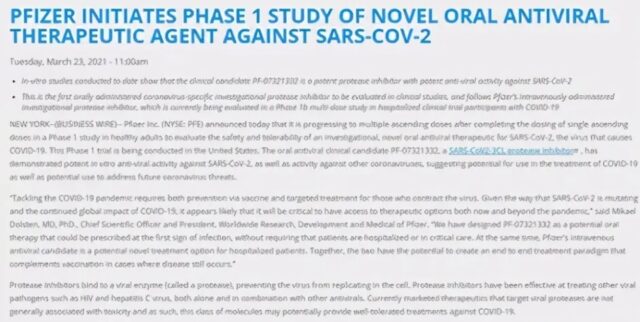Pfizer started trials of oral medicine for prevention of COVID-19 infection
- Normal Liver Cells Found to Promote Cancer Metastasis to the Liver
- Nearly 80% Complete Remission: Breakthrough in ADC Anti-Tumor Treatment
- Vaccination Against Common Diseases May Prevent Dementia!
- New Alzheimer’s Disease (AD) Diagnosis and Staging Criteria
- Breakthrough in Alzheimer’s Disease: New Nasal Spray Halts Cognitive Decline by Targeting Toxic Protein
- Can the Tap Water at the Paris Olympics be Drunk Directly?
PPfizer started trials of oral medicine for prevention of COVID-19 infection
- Should China be held legally responsible for the US’s $18 trillion COVID losses?
- CT Radiation Exposure Linked to Blood Cancer in Children and Adolescents
- FDA has mandated a top-level black box warning for all marketed CAR-T therapies
- Can people with high blood pressure eat peanuts?
- What is the difference between dopamine and dobutamine?
- How long can the patient live after heart stent surgery?
Pfizer started trials of oral medicine for prevention of COVID-19 infection.
Pfizer launches COVID-19 oral drug to prevent infection effect Phase II/III test track competition enters the sprint stage
On September 27, Pfizer announcement said the launch of the scope of application of a COVID-19 oral medication for the prevention of infection in high-risk adults, the COVID-19 viral effect of the test, the drug prior to further broaden the potential market.
Pfizer refers to this phase II/III trial as the New Coronavirus Post-Exposure Prevention Study (EPIC-PEP), which mainly tests the oral antiviral protease inhibitor PF-07321332 when combined with low-dose ritonavir to prevent high-risk adults from contracting the risk Effect.
The trial plans to recruit up to 2,660 people over 18 years of age who live in the same room with symptomatic infections and conduct double-blind control tests twice a day for five or ten consecutive days to test anti-infection and post-infection at 14 days after administration Symptoms of the situation.

Mikael Dolsten, chief scientific officer of Pfizer , said in a statement that in the context of the continuous impact of the COVID-19 epidemic on the world, we believe that it is necessary to provide effective treatment for people who have been infected with or have been exposed to the virus, so as to supplement the role of vaccines in quelling the epidemic.
If this trial is successful, this therapy is expected to take effect before the virus has a chance to replicate in large numbers, effectively preventing people who have been exposed to the virus from developing into symptomatic infections and inhibiting the occurrence of further infections.
This is also Pfizer’s third mid- to late-stage trial of PF-07321332 at the same time. Prior to this, the company launched the oral drug treatment experiment for high-risk and general-risk mild patients in July and August respectively.
According to the timetable previously given by Pfizer, if the COVID-19 (mild) oral drug goes well, it will apply for emergency use permission from the US FDA in the fourth quarter of this year. This will also be the end of last year after Pfizer/Biontech was approved for marketing. There is another important milestone in the struggle.
In addition to racing against the virus, Pfizer is also facing fierce competition for the title of “the first COVID-19-specific oral medicine.”
At present, Roche Pharmaceuticals, Merck’s RNA polymerase inhibitors AT-527 and Molnupiravir, and the second-generation AR antagonist procrulamide of the Chinese listed company pioneering pharmaceuticals have all entered the phase III trial stage.
The market generally expects these drugs to be in the In the fourth quarter, the preliminary results were successively disclosed and emergency use licenses were applied. The COVID-19 oral drug developed by Japan’s SHIONOGI Pharmaceutical, which had previously developed the “super flu drug” Xofluza, also entered the clinical trial phase this summer.
Israel and the United States will cooperate to develop an oral COVID-19 vaccine to replace the original injectable vaccine.

Compared with injectable vaccines, the side effects of oral vaccines are relatively smaller, and the operation is more convenient, and the labor cost of injection is also saved, convenient and fast, and easier to popularize and promote. This oral vaccine is now applying for clinical trials, and testing may begin in June, and it may be available to the public in the fall.
(source:internet, reference only)
Disclaimer of medicaltrend.org
Important Note: The information provided is for informational purposes only and should not be considered as medical advice.



